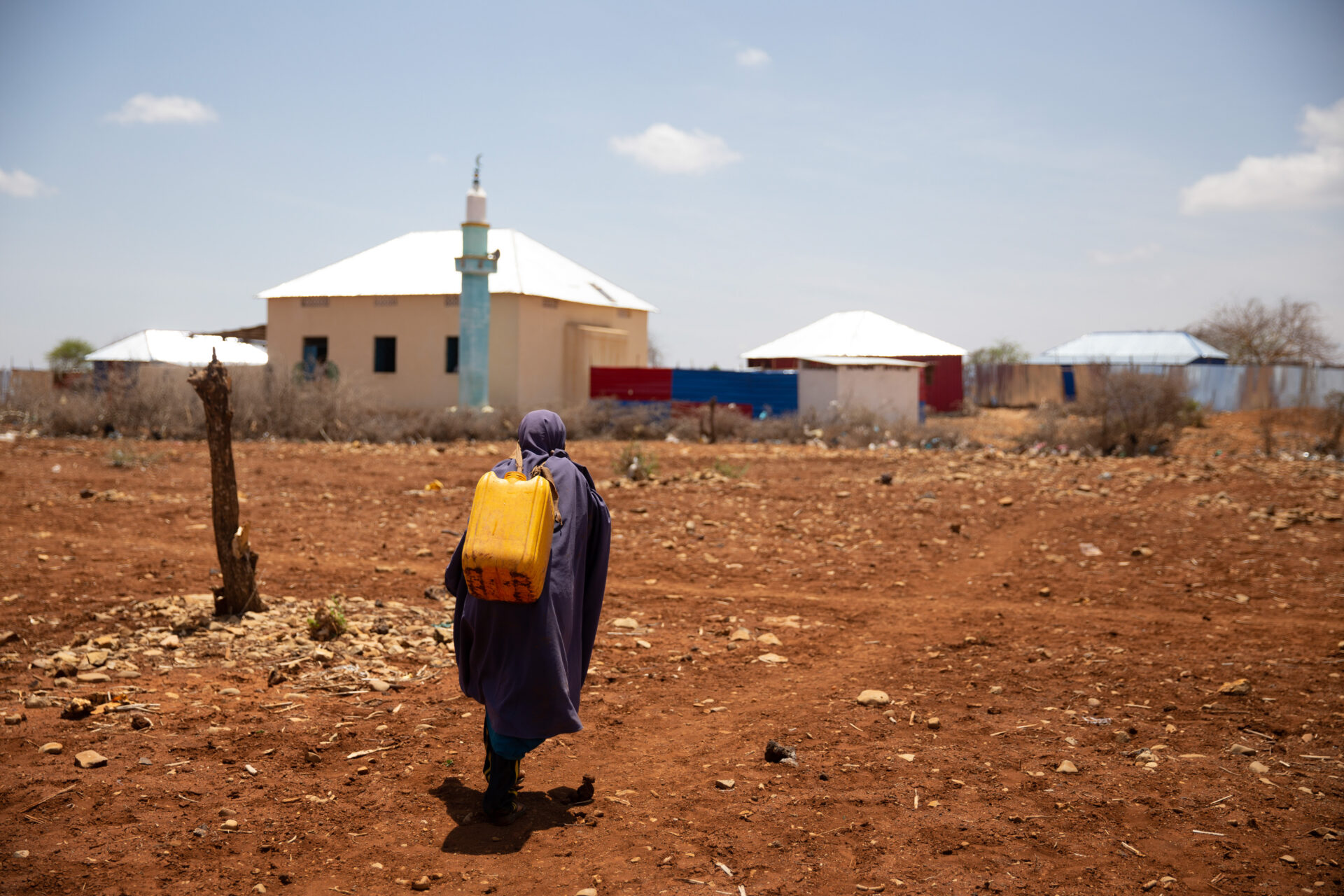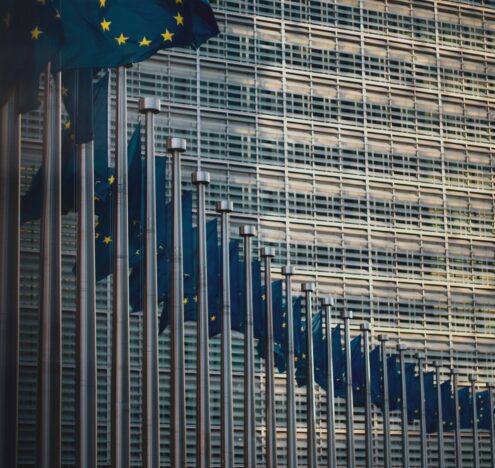Hospitals are filled to capacity with shrieking children and worried mothers. Doctors are rushing, trying to save the lives of many, already knowing that they won’t be able to assist all. Fathers are quiet, unsure of how to comfort their loved ones, and unsure of how to make ends meet. Families arrive in Mogadishu, the capital of Somalia, with little belongings and no livestock — and no way to make a living.
Somalia is currently experiencing devasting conditions rooted in several man-made crises. Drought, famine, and gender-based violence are all wreaking havoc in the country, burdening the lives of women, girls, men, and boys — and all of these crises are rooted in climate change. But Somalia has contributed to less than 0.003% of global greenhouse gas emissions.
The UN estimates that approximately 4 children or 2 adults per 10,000 people will die each day in Somalia due to the ongoing drought. The World Health Organization documented the loss of over 43,000 lives in 2022 alone and predicts that 18,000 more will die in the first six months of 2023. Approximately 1.5 million children are malnourished due to drought and food insecurity. The simultaneous fight led by the Somali military forces against Al-Shabab, the predominant terrorist group in the country, coupled with the ongoing climate crisis, is expected to take the lives of more than 500,000 children by the middle of 2023. The war against Al-Shabab has also resulted in an increased number of displaced people across the country — and 80% of are Somali women and children. Climate change is aggravating this internal displacement.
At a point where Somalia seemed to finally be on its way to recovery from three decades of civil war, darkness coupled with corruption has overcome the country. And Somali women and girls are facing the consequences.
TROUBLESOME NUMBERS
As the people of Somalia struggle amidst climate change, war, and conflict, women and girls continue to be disproportionately affected because of being more vulnerable to sexual abuse and exploitation. In fact, reports of gender-based violence, rape, and violence against women and girls have increased in Mogadishu and various displacement camps across the country. In 2021, the UN reported an 80% increase in gender-based violence in Somalia. But how can the threat of climate change lead to more women and girls being harmed?
The current discourse on ways to mitigate the effects of climate change is filled with numbers and theories, with very little focus on the disproportionate burden it has on the lives of women and girls and the clear power dynamics at play.
Slow-onset climate events, such as drought and famine, significantly limit a woman’s access to economic resources and financial independence. Gendered roles in Somalia’s society have pushed women to become highly dependent on climate-sensitive labor, such as jobs related to farming and animal herding. In times of drought and hunger, women are stripped from their main source of personal autonomy and financial independence: their ability to work. This loss of independence further influences women and girls to be dependent on others, making them more vulnerable to forms of gender-based violence or sexual exploitation and abuse.
Early marriage and female genital mutilation/cutting (FGM/C) are also on the rise in Somalia as this drought season intensifies. Child/forced marriage and FGM/C are both pervasive cultural norms in Somalia; nearly 99% of Somali women and girls have experienced female genital mutilation. FGM/C is linked with early marriage as a rite of passage for marriage and increases a girl’s chance of marriage, which could mean saving her family from food insecurity or poverty. Humanitarian organizations on the ground have linked worsening climate conditions to families having to make choices of having to marry off their young daughter(s) out of fear of continuous poverty.
Early or forced marriage can negatively affect a woman’s sexual and reproductive health. Intimate partner violence continues to be the highest reported type of gender-based violence experienced by Somali women due to displacement, food insecurity, and early marriage. Increasing rates of unwanted pregnancies and early marriage can lead to severe reproductive and sexual health problems, ultimately affecting the mental, physical, and psychosocial well-being of women.
To make the situation even more dire, an estimated 2 million women and girls of reproductive age are reported to have been affected by the drought in Somalia, of which 380,000 are pregnant and in need of reproductive and maternal health services. Women and girls in Somalia already face a lack of access to adequate maternal healthcare services due to the country’s overall limited access to healthcare services. With one of the highest maternal mortality ratios in the world (692 deaths per 100,000 lives births), Somali mothers are even more vulnerable to malnourishment, pre-term delivery, and other negative maternal health outcomes during times of drought and famine as they face a myriad of intersecting public health disparities.
The women and girls of Somalia need immediate help through innovative solutions. Somali women and girls are the victims of climate change, which needs to be addressed.
THE UNPRODUCTIVE DISCOURSE
The current discourse on ways to mitigate the effects of climate change is filled with numbers and theories, with very little focus on the disproportionate burden it has on the lives of women and girls and the clear power dynamics at play. There must be a prevailing understanding that climate change affects humans holistically, beginning with recognizing the clear link between climate change and gender-based violence. The dialogue surrounding climate change must be about more than understanding the science. The effects of climate change are far-reaching, and how we address its negative impacts must be innovative and effective. Policies need to focus on the voices of those disproportionately affected like women and girls in emergency contexts like Somalia.
Addressing climate change is imperative to reducing the prevalence of gender-based violence in emergency contexts, as in Somalia. In order to address the worsening climate crisis in Somalia, the newly appointed government created a new Ministry of Environment and Climate Change. The ministry aims to create legislation and prevention strategies to mitigate the negative effects of climate change and advance sustainable development, develop a climate-resilient economy, and eradicate poverty. Working collaboratively with both federal-level ministries and ministries at the state level, the Somali government seems to have recognized the importance of community-led climate change prevention strategies to center the needs of the Somali people.
While progress is being made at the national level, the numbers show that the people of Somalia are facing several crises. Current interventions do not address the intersectionality between climate change, gender-based violence, and harmful cultural norms that are making women and girls more vulnerable to violence. Emergency response programs led by humanitarian organizations must recognize the power dynamics at play in these vulnerable contexts and utilize strategic response mechanisms that center the voices of women and girls.
Nonprofit organizations on the ground are also creating innovative solutions to address the intersecting challenges and consequences of climate change. Action for Women and Children Concern is a Somali-led, grassroots nongovernmental organization that aims to eradicate poverty and mitigate the consequences of climate change through the empowerment of women and girls. An initiative led by Action for Women and Children Concern focuses on educating internally displaced women and girls in Somalia on cost-effective ways to respond to disaster risk and consequences.
Through the funding of the Cities Alliance, the Swedish Development Cooperation, and the German Federal Ministry of Economic Cooperation, Action for Women and Children Concern was able to develop a mobile-phone SMS alert system that provides community members with warning of climate-related disasters before it strikes. Action for Women and Children Concern has also partnered with local women’s groups in Somalia to create gender-based violence prevention strategies to effectively reduce climate-induced gender-based violence.
The women and girls of Somalia are suffering but remain hopeful for a new life. This traditional Somali proverb beautifully describes the strength and resilience of the women and girls of Somalia and across the world: “Haween la’aani waa hoy la’aan,” which means “to be without our women means to be without a home.”





















